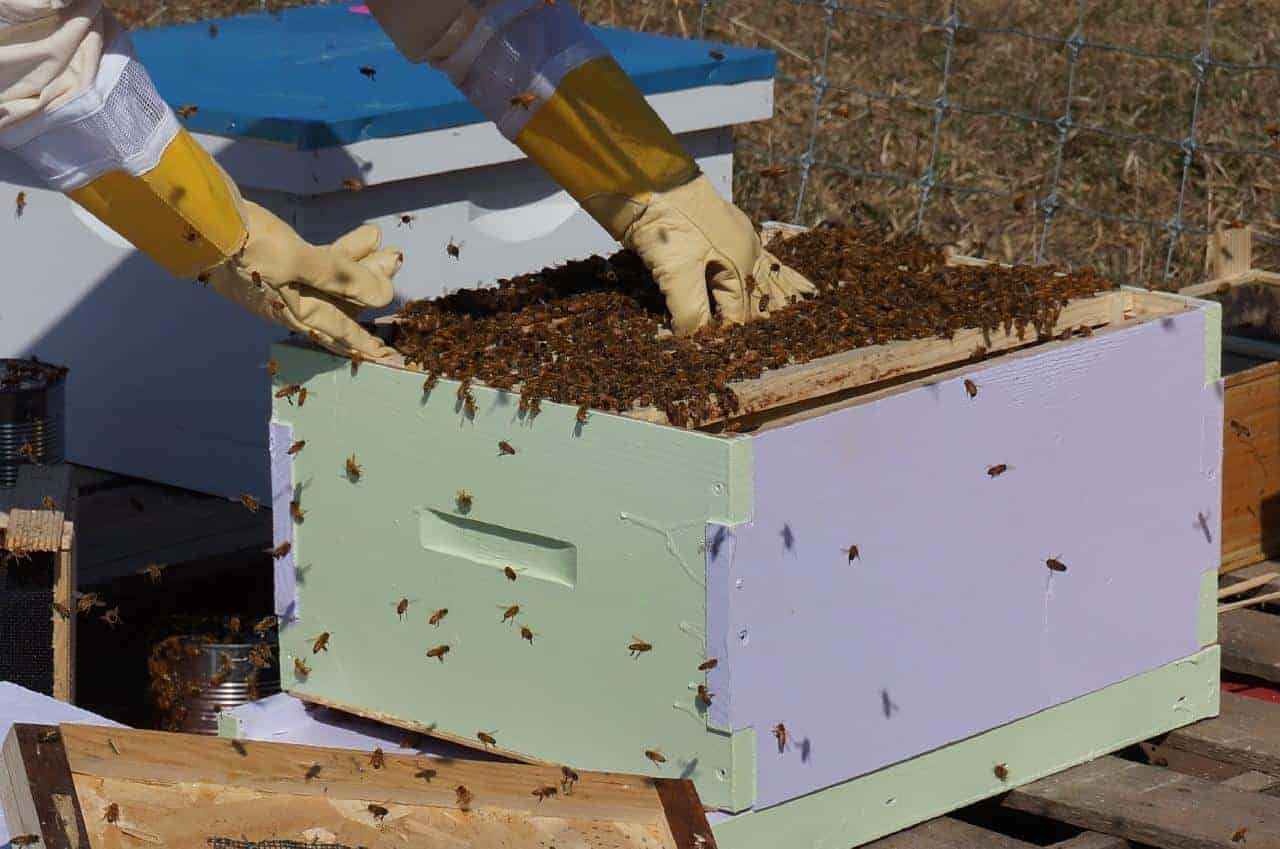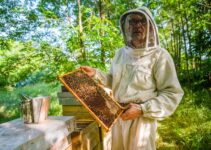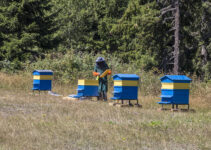Considering beekeeping as a profession or a hobby but aren’t sure where to start? There are a few things you’re going to need to get prepared for this beekeeping journey and one of them is knowing whether you should start with packaged bees or a Nucleus Colony.
Because a Nucleus Colony is already partially formed and its queen bee has been accepted into the colony, Nucs are therefore an easier option when starting beekeeping as a beginner. Starting with a Nucleus Colony means you already have everything you need to begin beekeeping successfully.
Owning and breeding bees for their honey is called beekeeping. We maintain bee colonies using man-made hives and collect the honey they produce, and then sell bees to other beekeepers when the bees produce a large enough colony. But there is so much more to beekeeping than that. Are you struggling to decide whether you should start with packaged bees or Nucs? Read on to find out the pros and cons of each to make a more educated decision.
What are Packaged Bees?
Packaged bees are boxes of bees filled with approximately 3lbs (1.36kg) of bees, which usually estimates to be around 10,000 bees in a box or a package. The bees in this box are taken from numerous other strong hives and shaken into the package through a funnel. A randomly selected queen, who has recently been mated, is placed safely in the package, in a separate type of bee cage, so she is well protected from harm.
Other than the shaken-up bees who have come from different hives, and the protected queen, there is nothing else included with packaged bees. No comb, no honey, no guarantee that the bees will work together to form a working colony.
These packages can be shipped all over the world for beekeepers to continue maintaining bee colonies and producing honey. However, most bee professionals would recommend if you are starting a new beekeeping line of work, to purchase your packages from closer to home where the bees have already acclimatized to the weather.
You should take note of your bee packages when they arrive and the condition the bees arrive in. If there are a large number of bees dead at the bottom of the package, something has gone wrong in transit and your bee colony may not survive. Consult with your provider for advice.
Advantages of Packaged Bees
- Approximately 10,000 bees are ready to create a new hive.
- Can be shipped anywhere in the world.
- Can survive long-distance shipping up to 7 days.
- Usually readily available for beekeepers in spring as packages are produced on a large scale.
- Beekeepers have the opportunity to watch bees work their hive and honey magic from scratch.
- It’s cheaper to buy packaged bees.
- You can get your packaged bees pretty early in the spring (if you live close to where you’re purchasing from) to begin your beekeeping journey sooner!
Disadvantages of Packaged Bees
- The shipment of almost 10,000 bees in one crate is very stressful for bee colonies.
- The queen is selected at random from a queen rearing hive and added to the packaged bees. She is therefore at risk of being killed or rejected by the bees she is randomly placed with.
- There is no guarantee that the recently mated queen was mated well enough to produce more bees.
- Shipped bees may not be acclimated to your weather.
- The bees can freeze and/or overheat during the shipping process and shipping can be delayed for unforeseen circumstances.
- Too many bees in a package are at risk of dying off if there’s not enough sugar water to sustain them all.
- Because the bees come from multiple other colonies, there is no guarantee they will bond and work well together as a colony.
- You have to feed your packaged bees for a few weeks until they start working together and produce enough to feed themselves.
How to Install packaged Bees
Most expert beekeepers will agree that it’s best to wait for a day with good weather to rehome your package bees. If your package bees have come from far away and have been in transit for a couple of days or more, they are probably very stressed and will need to be transferred into their new hive as soon as possible, but you want the right conditions too.
Installing packaged bees is slightly more complex than installing Nucleus bees into their new home which you can read further below.
Here is a short step-by-step process of how to install packaged bees:
- Place your package on top of your brood box.
- Have your frames ready, typically 4 – 5, but you can have as many as you like depending on the size of your hive.
- Remove the wooden lid from the package and loosen or pry the can out of the package.
- Put the lid back on quickly to try and keep as many bees inside as you can.
- The queen will be inside the package in a separate cage, you need to remove her from the cage carefully so that you can separate her from the bees.
- Depending on the type of lid on the little queen cage, you may have to remove it before inserting her cage (right way up or sideways so she doesn’t get stuck) into the hive. Stick her cage onto one of the combs, not at the bottom of the hive, she may need an escape route.
- Now you can turn your package box upside down over the hive, remove the lid so the bees can get down into the hive around the queen and cover the top with a lid, so the bees stay in the hive.
- The bees will hopefully begin to establish their place in the hive and form a colony to begin their work as an efficient colony that is also accepting of their new queen bee.
You can check out a great example by Doug the Bee Guy of how to successfully install your bee package here.
What are Nucs?
The term “Nucs” is derived from the word “Nucleus”. Nucleus colonies or hives are partially developed hives in which the bee colony has already started to build their brood nest, honey stores, and infrastructure, needed to maintain a healthy colony and hive. Nucs also have an already established queen, which is a huge advantage for the success of a Nucleus bee colony.
Nucleus bees have well-established frames of combs that come with their harvest box. You can put these straight into your man-made hive for the bees to continue life as usual. Because of their already established colonies and partially developed hives, you don’t need to purchase Nucs at the start of spring and can wait until later in the season if needed.
Beekeepers would say that purchasing a Nucleus Hive gives you a head start.
Advantages of a Nucleus Hive
- The bees have already bonded and are working as an efficient colony.
- The queen has been accepted by the colony and isn’t at risk of being killed or rejected.
- The queen is already mating and laying eggs because she has been accepted
- Nucleus colonies have plenty of time to build up their hive and foundations, ready for winter even when purchased later in the season.
- You can purchase Nucs later in the season if needed, in fact, this is recommended so they have valuable time to establish the beginning foundations of their hive.
- The bees don’t have to work so hard to collect pollen and nectar when they already have plenty which might make caring for your bee colony slightly easier.
- Nucs come with a drawn honeycomb and brood.
- They are a great start for beginner beekeepers.
Disadvantages of a Nucleus Hive
- Nucs can’t be shipped because their combs are too fragile. This means they can only be picked up or delivered and carefully moved to a new location.
- Nucs are unfortunately but expectedly much more expensive than package bees.
- Nucs bring a higher chance of pests and disease through the already-drawn honeycomb.
How to Install Nucleus Hives
Not surprisingly, because Nucs are already established and ahead of packaged bees, installing their hive can be easier and quicker. It can also be harder if you consider how fragile the 4-5 frames of comb are and how breaking them can greatly affect the mood and working behavior of your bees.
Here’s a simple step by step process of how to install your Nucleus Hive when it arrives:
- Place the Nuc box directly in the hive. On a side note, think carefully about where you want your apiary, it’s not great for the bees to have their hive moved once they’ve been settled, so choose a place you won’t regret having your bees.
- Open the entrance of the Nuc box and let the bees swarm out and give them time to settle into their new home. They should start working almost right away.
- After approximately 24-hours you can gently put the frames into the new hive body. Remember to put the frames in the exact same order they were in while in the Nucleus box because the bees would have worked hard to establish that order and are familiar with it.
- Ensure all of the bees are out of the Nucleus box before taking it out of the hive.
- Fill in the rest of the hive with empty frames.
- Remember to replace your hive cover.
- Your bees are ready to continue working effectively for their colony and you can sit back and enjoy watching bees do what they do best.
Why is it Important for Bee Colonies to Have a Queen Bee?
It is essential for bee colonies to have a queen bee to control the unity of the bee colony and to lay eggs to continuously produce new bees to ensure the future of the colony is intact. Without a queen bee and fertilized eggs, the colony will die out.
It’s important to understand that when you purchase packaged bees, the queen has been chosen at random from a separate “queen-rearing” colony and added to your package. Although they are protected and added via a small bee cage to keep them safe, the queen bee might not be accepted by her new colony that has also been chosen and taken from randomly selected, stronger hives, that already had a queen.
Packaged bees should consist of worker bees, drone bees, and one sole queen bee that must all learn to form a united front and work together to survive. Unfortunately, this doesn’t always happen. Which might make one question, if bee colonies need a queen bee to survive, why would they reject her?
How does the rejection of a queen bee affect packaged bees?
In order to survive, bee colonies need to have a healthy bee queen that the drone bees mate with for the queen to lay her fertilized eggs. But what happens if the packaged bees reject the queen bee that was chosen at random to be the colony’s queen bee?
Here are some of the reasons why bee new bee colonies, such as those in a new package, might reject the queen:
- Worker bees tend to reject queens they are not familiar with. Having come from an already well-established and strong hive, the bees already had a queen and are familiar with her pheromones, so this new unrecognizable queen is seen as an “invader”.
- If the queen is viewed as weak, the worker bees will kill her.
- The new queen is introduced too soon. It’s recommended that queen bees in a package are introduced at least a day after the new colony has been queen-less.
The beekeeper has a short timeframe in which they can reintroduce a new queen bee and hope that she is accepted by the colony. Without the queen, the colony is not regulated and controlled by the necessary pheromones the queen uses to keep them in line and work as a team. The colony will start to die off if the queen is not reintroduced and accepted quickly enough.
For those that are new to beekeeping, you might be wondering how the bees reject or kill their queen. It’s a curious process that has been researched in bee behavior, but the way a queen bee is rejected is simply by killing her.
The process is called “Queen Balling” and usually ends with the queen being killed, or dying. In some cases, the queen is left to live and can either be stored back in her little cage to try and be reinstated in a couple of days, or she will die from the harm and stress caused by the “balling” procedure.
Queen Balling is where the worker bees will form a circle and surround the queen bee and attack and sting her repeatedly as well as suffocate her with heat exhaustion until she dies or is left weak enough to gradually die after the event.
If you’d like to see what happens to a rejected queen bee, you can check out this YouTube video by Barnyard Bees here.
Packaged Bees VS Nucleus Hives
As you can see there are numerous advantages and disadvantages accompanying both Packaged Bees and Nucs. This doesn’t make it easy to make an educated decision on which bees are right for you.
Check out this table below for a more detailed version of the differences between packaged Bees and Nucleus Hives:
| Packaged Bees | Nucleus Hives | |
| How many bees? | Approximately 10,000 bees for a 3lbs package | Approximately 10,000 – 15,000 |
| Established Colony? | Taken from multiple established colonies. | An already established colony. |
| Established Hive? | Starting from scratch. You have to shake the bees into the man-made hive you’ve created for them. Prepare for a few stings or get yourself a beekeeper suit. | Partially developed hive. Because their hive is already partially developed, you receive 4-5 frames of comb ready for installing in the hive. |
| Can be delivered? | Can be shipped all over the world | Can only be delivered or picked up directly. |
| Queen Bee? | Randomly selected from a queen-rearing hive and risks being rejected by the new colony. | Has established her place as the queen bee of the Nucs Hive. |
| Need to feed? | Package bees need to be fed sugar water/syrup to assist them in building the comb, brood, and stores for winter. | Nucleus hives are already feeding on their own and won’t usually need your help. |
| Installation | Can be a drawn-out process that takes time due to the bees being from different colonies. | Simply place the combs in the same order into the new hive. |
Conclusion
As always, there are advantages and disadvantages to both available options and it is up to you, and your confidence and time frame, that will determine which option to choose. However, we believe that Nucs are a good starting place because the colony is already working together, and the queen is not at risk of being killed or rejected which is a huge benefit for you as a beekeeper.




